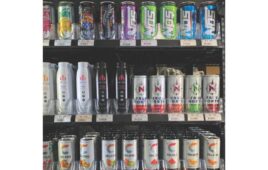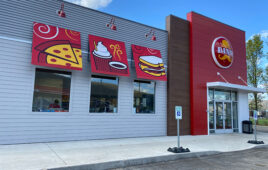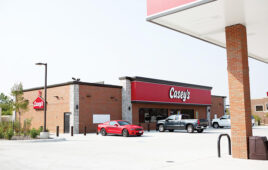As customers demand fresh and healthy fare, c-store operators share how they’re adapting to customer preferences.
By Howard Riell, Associate Editor
More convenience store operators are making bakery a priority, either through in-store programs or partnering with national brands and local bakeries that convert their locations into destination stops.
“We have recently added a site approved by Dunkin’ Donuts and are designing a convenience store/Dunkin’ combo unit,” said Tom Eveland, vice president and general manager for Rocket Oil Co., a Madisonville, Ky.-based operator of 16 convenience stores and one Subway location.
Out West, another c-store has made bakery a key component of its foodservice strategy.
“We strive to offer a whole new option to the fuel/convenience customer,” said Ed Pollock, an owner of Grasslands Market in Douglas, Wyo. “Our reputation for quality food is solid in our community. We bring the freshest and highest-quality ingredients to our store. (We) offer made-fresh-to-order or grab-n-go daily breakfast; lunch and dinner; breakfast and deli sandwiches; pizzas; ribs; and bakery goods at great, competitive prices. We designed and built our store to look more on the line of a Whole Foods than a QuikTrip or Wawa, which are great stores.”
It was when it expanded its bakery that Grasslands saw noticeable results.
“We opened a year ago with a bakery program,” Pollock said. “We proof and/or bake from frozen product: croissants, pastries, cookies and more.” The period from 4 a.m. to mid-afternoon has proven strong for bakery sales, bolstered by the store’s premium coffee program, which includes a house blend and single-roast bold variety. The location sells about 30 gallons of coffee per day.
It turned out, the c-store’s coffee program and bakery went hand-in-hand as well as the marketing benefits of sight and smell.
“I believe if a commitment has been made to quality coffee then you’re halfway there,” Pollock said. “Quality bakery can be done with frozen these days that is very good. Proofed and baked is better, so if you have the space and labor it will do better.”
In addition, Pollock recommended merchandising baked goods as close to the coffee station or checkout as possible.
HIGH MARGINS
Bakery items are typically high-margin products for retailers, noted Dwight Hill, a partner in McMillanDoolittle LLP, a retail consulting firm based in Chicago. “But I think the key thing from a customer-experience point of view is obviously going to be freshness, cleanliness and high-quality displays that really illustrate, ‘Look, I rotate the stock frequently, I’ve got clear dating and date codes.’”
An innovative bakery program can also cater to consumers’ health concerns.
“Mostly what people are wanting to buy today when it comes to baked goods is something a little healthier,” said Matt Hudson, principal of Hudson Head, a retail consultancy based in Ft. Worth, Texas. “They’re looking for organic things, gluten-free things, things that are a little bit different. For a c-store owner to be able to say ‘This item was baked fresh, right here, locally’ is as compelling an argument as ‘it was made in the back room.’ In fact, if it’s done right, it is even more compelling.”
Another expert explained that wholesale can be the way to go for a c-store working to establish an effective bakery strategy.
“There are amazing, quality goods out there in the wholesale marketplace that would allow a store to gain the advantages of fresh-baked product without the hassles of preparation,” said Santa Maria, Calif.-based foodservice consultant Ryan Gromfin. “Look at Subway. It uses a frozen bread that is proofed and baked in a combo unit at the store level. Subway gets the amazing benefits of fresh bread and the smell that will make anybody hungry, but doesn’t have to worry about a baker missing a shift or forgetting to add yeast.”
The same goes for cookies, Gromfin added.
“Most brands will even supply the store with an oven that is designed to cook its cookies perfectly from frozen to hot-and-ready in minutes without adding a hood, any special mixing equipment or additional staff training.”
LOAVES TO GO
More and more, c-stores are finding that investing in quality baked goods is reaping healthy financial returns.
“I would be interested to see the store that could not benefit from having some sort of bakery program,” said Victor Arechavaleta, vice president of business development for Farm Stores Corp. in Miami, Fla. “It would have to be a very special circumstance. The only reason a store shouldn’t consider implementing a bakery program is if an operations team, being honest with themselves, would admit that they are not willing to make the investment in the operations a good bakery program requires.”
With more than 100 Express Markets throughout Florida, Farm Stores is one of the region’s fastest growing convenience retailers.
Of course, a commitment to food safety, freshness and quality is much more significant than the cost of even high-end equipment, which isn’t typically necessary, he added. “You can spend all you want on fancy ovens and warmers, but if you don’t commit to turning your store into a clean bakery of sorts, you may as well not even try.”
On the other hand, c-stores that commit to such an operational investment can see a handsome return—even with a limited, but focused, bakery menu.
“Are you willing to spend a significant amount of time every day on prepping, cleaning and maintaining an attractive environment in your store?” Arechavaleta asked. “Are you willing to accept that you will have some spoilage throughout the day, and that it has to be managed, but accepted, as a necessary cost?”
That’s because ultimately, running a quality bakery program trumps short-term spoilage occurrences.
“We have been extremely successful over the past few years with our in-store bakery program,” Arechavaleta continued, “to the tune of about 500-plus baked loaves sold per week, per store, in the stores that participate in the program.”
Which baked items will sell most or least depends on a store’s customer profile, he pointed out. “We’ve been extremely successful with fresh-baked loaves of bread, but our customer profile is dominated by take-home purchases, so that makes sense.” In Farm Store locations with a higher percentage of on-the-go customers, the retailer has done well with fresh-baked snacks, finger foods and cookies.
“In every case, the products that will sell best are those offered fresh—as fresh as possible,” Arechavaleta said. “Nothing drives repeat business and success as well as product quality.”
STALE SALES
In the same way, he added, nothing will doom a bakery program as effectively as giving a customer a stale product.
“If you’re lucky, the customer will complain and you’ll have the opportunity to correct the situation,” Arechavaleta said. “But, what usually happens is the customer throws the product away and never trusts you again. This is Foodservice 101, and an operator has to make the commitment to being in the fresh food business and thinking like a restaurant operator instead of a retailer.”
Having managed both chain and independent stores, Arechavaleta said he has noticed a polarity. “Employees tend to either get this or not get it. It is easier to teach a food person the retail business than it is to teach a retailer the fresh food business, but anyone can learn the basics if he is willing to commit to it.”
Connecting with shoppers via their human senses truly makes good business sense, Arechavaleta concluded.
“Baking in-store is a great idea. There is no way to provide higher quality products to your customer,” Arechavaleta said. “On the other hand, there are lots of great quality thaw-and-serve products available if you won’t or can’t make the full commitment to an in-store baking program. It’s good to have these choices, and a mix of in-store baking and thaw-and-serve products is probably the best answer.”




